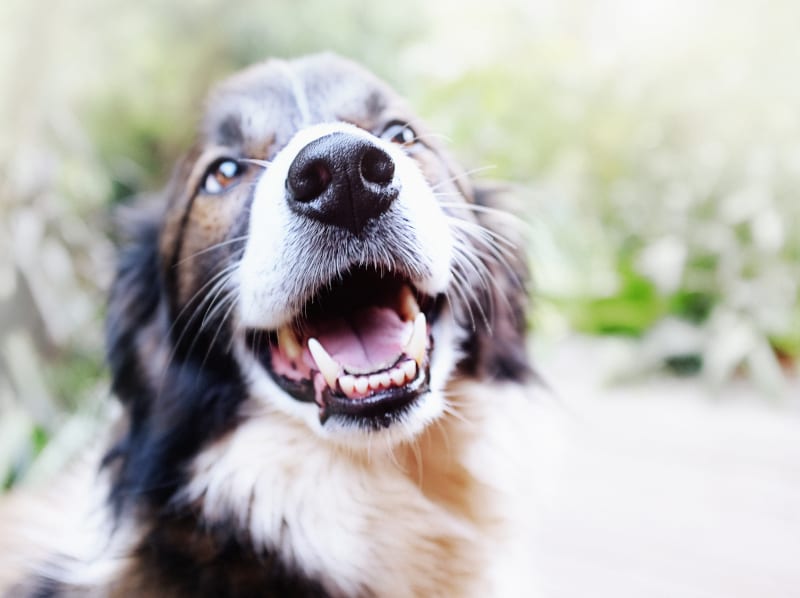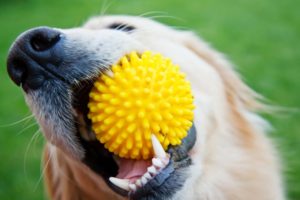Bad Breath in a Dog: How to Get Rid of It for Oak Park Pet Owners


Common Causes of Bad Breath in Dogs in Oak Park
The most common cause of dog bad breath is dental disease. Plaque and tartar harbor bacteria and when they build up on your pet’s teeth, they cause a foul odor. More than half of all dogs have some form of dental disease by the time they’re three years old.
Signs of disease include discolored teeth, red and bleeding gums, loose or broken teeth, difficulty eating or picking up toys, and of course, bad breath.
Another common cause of odorous breath is simply eating something they shouldn’t have. Dogs can eat some pretty gross things including their own poo, dead animals, and garbage. If your dog has bad breath that doesn’t last, it could just be something he/she ate!
A few other reasons your dog has bad breath are underlying health conditions. Diabetes, kidney disease, and liver disease can all make your pet’s breath smell something awful. Dogs with diabetes often have a sickly-sweet odor to their breath; those with kidney disease will have breath smelling of urine; and dogs with particularly foul breath might have liver disease.
So, how can you get rid of your pet’s bad breath in Oak Park, IL? Well, it depends on what’s causing it! Let’s look at how to solve each cause listed above.
Make Dental Care a Priority
The most likely cause of bad breath in dogs is dental disease. Dental care for your dog is an essential part of their preventive care. Dental disease, and the problems that come with it, can be entirely prevented with teeth cleaning at the vet and a home regime. To prevent dental issues and the bad breath that comes with it, follow this plan:
Visit the vet for your pet’s annual exam. Your vet will check your pet’s teeth during their physical and will recommend a professional teeth cleaning if there are significant signs of dental disease.
Brush your dog’s teeth daily. Brushing is the single best way to reduce plaque and tartar build-up. Training your dog to accept teeth brushing as a puppy is ideal, but even older dogs can be trained with enough patience and perseverance!
Give your dog dental treats and chews. CET and OraVet chews are just two options of dental chews that help to break down tartar with every bite.
Give your dog chew toys. Some are specifically made for dental health.
Ask your vet about a prescription dental diet. These are designed for optimal dental health and can help keep your pet’s teeth white and their breath fresh.
Keep Unsupervised Snacking to a Minimum

Dogs are drawn to smells that frankly disgust us. Rotting carrion, fresh stool, and garbage are gross to us, but gourmet to your dog. When they eat these pungent snacks, their breath will often reek for a few days. To prevent your dog from unsupervised snacking, there are a few things you can do:
Always make sure your garbage is inaccessible to your pet. Keep it behind a closed door and always take the full garbage bag straight to the dumpster or curbside bin.
Pick up any poo right away to give your dog little to no chance to investigate their delectable droppings.
Practice commands like “leave it” and “come” with your dog to help control their morbid fascination with dead animals.
Take Your Pup to the Vet in Oak Park
In the event your dog’s bad breath is caused by an underlying health condition, you’ll need to visit your vet. They’ll be able to run some diagnostic work-ups to get a thorough understanding of the problems and then work with you to develop a treatment plan.
Diabetes, kidney disease, and liver disease are all chronic conditions that will require medication for the rest of your pet’s life. Once your pet starts their treatment plan, their foul breath should clear up pretty quickly—and they should start feeling a lot better, too. Dogs with these conditions, depending on their severity, can still live long and happy lives, so you can still enjoy plenty of doggy kisses.
If you think your pet might have a dental problem, underlying health condition, or you’re struggling to control their bad eating habits, talk to your veterinarian! We’ll be able to help you give your pet fresher breath while also contributing to a higher quality of life for your best friend. Call us at (708) 248-8888 to Make An Appointment!
